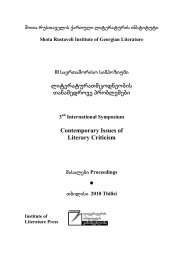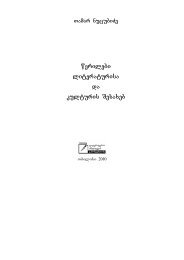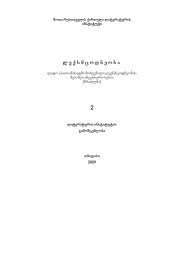Shota Rustaveli Institute of Georgian Literature
Shota Rustaveli Institute of Georgian Literature
Shota Rustaveli Institute of Georgian Literature
You also want an ePaper? Increase the reach of your titles
YUMPU automatically turns print PDFs into web optimized ePapers that Google loves.
the US has a very low power distance index 1 and therefore the main features <strong>of</strong> North American culture are equality<br />
and positive feed-back. According to many scholars equality “should be considered an assumption <strong>of</strong> American<br />
culture, social conventions tend to be more informal and social reciprocities are much less clearly defined (.Stewart et<br />
al., 1998). Hierarchy, inequality in power and influence, are seen as man-made (Storti, 2001).<br />
Significantly, the emergence <strong>of</strong> pc in the post-communist world matches B.Fay’s non-essentialist view <strong>of</strong><br />
cultures as open systems: i.e. “cultures are ideational entities, as such they are permeable, susceptible to influence from<br />
other cultures” (Fay, 1996). Grotesque, rude and inconsiderate Sacha Barron Cohen’s film Borat may arguably be, but<br />
it does mirror a certain innocence apparent in the <strong>of</strong>ficial approach to all kinds <strong>of</strong> minorities during the communist<br />
regime. Retarded, invalids, cripples – all these words were used in Russia, Bulgaria and other socialist countries<br />
indiscriminately, without fear that they may cause <strong>of</strong>fence. Thus there is a lot to be said for new political correctness.<br />
At the same time in post-communist countries such as Bulgaria pc doesn’t embrace all the subjects referred to<br />
above in the same degree, i.e. fewer objects and concepts are un-pc. A case in point: the global reality is post-modern<br />
and anti-elitist. As opposed to North America, in Bulgarian parlance elite is a very positive word and not only schools<br />
are described as elite but such unlikely products as doors and window frames. It should also be stressed that the<br />
otherisation <strong>of</strong> some signally unequal groups is still prominent. The objects <strong>of</strong> in/equality may coincide or differ. Thus<br />
in Bulgaria some race pc is prominent: цигани (gypsies) is a new taboo, still alien to many people. In a radio interview<br />
the author <strong>of</strong> a nostalgic new novel called When Romas Were Gypsies claims not to be anti-gypsy (or anti-roma);<br />
however he insists on the old label and voices his dislike <strong>of</strong> the new one. At the same time, a Bulgarian gypsy ranger<br />
who claims to be assimilated says: “I do not mind being called a gypsy, but I’d rather be referred to by a more<br />
international term.” (i.e. “roma” – IP). 2 Significantly, there is quite a range <strong>of</strong> derogatory expressions for gypsies in<br />
Bulgarian: циганин – ром – мангал –мангасар and even the borrowing джипси. The expression като бял човек (as<br />
a white man/person) is still very common and it implies the kind <strong>of</strong> praise which would be considered racist in US or<br />
Europe. The language reflects some kind <strong>of</strong> national inferiority complex as evidenced by the expression – “хубава<br />
работа, ама българска” (a nice thing/job, etc. but the way it happens in Bulgaria, i.e. it is bad or faulty).<br />
Conversely, the category which has made a lot <strong>of</strong> progress in Bulgaria is gender pc, as evidenced by a change in<br />
addresses and a greater awareness <strong>of</strong> the likelihood <strong>of</strong> an <strong>of</strong>fence and in advertising strategies: for instance, the macho<br />
beer advertising <strong>of</strong> Zagorka beer: – What does a man need – a good house, a good car, a good woman … good beer -<br />
is now safely relegated to the past because <strong>of</strong> a successful court case won by a businesswoman from Stara Zagora, the<br />
seat <strong>of</strong> the brewery.<br />
While rankism and the resulting pc are common in Bulgaria, ageism pc is currently not very prominent. There<br />
are, however, many examples <strong>of</strong> rankism pc in Bulgaria: инспекторка (“female inspector”) instead <strong>of</strong> секретарка<br />
(“secretary”), хигиенисткa (“hygiene worker”) instead <strong>of</strong> чистачка (“cleaning woman.”) The only typically<br />
Bulgarian pc example may be traced back to the time <strong>of</strong> socialism when S<strong>of</strong>ia – the capital – was opposed to other<br />
towns and villages, the “provinces,” and was viewed as “more equal” than other places. There is a still perceived<br />
inequality between S<strong>of</strong>ia universities and “provincial” universities. This is why a pr<strong>of</strong>essor from the University <strong>of</strong><br />
Veliko Tarnovo in Central Bulgaria urged colleagues from the University <strong>of</strong> S<strong>of</strong>ia at a meeting to be politically correct<br />
and not to talk about S<strong>of</strong>ia University and other universities. Note that nothing similar exists e.g. in the UK where the<br />
opposition “urban-rural” is not based on the principle <strong>of</strong> equality, and even “urban-suburban” (in the meaning <strong>of</strong><br />
“narrow-minded”, “boring”) is not a pc area.<br />
By and large, PC stops at home, which cannot but testify to its use as some kind <strong>of</strong> behavioural regulator.<br />
Hence, on BBC World Service news one can hear the following comment: “They (the Belgian rightist party declared<br />
racist - IP) are popular because they are not afraid not to be politically correct and say what ordinary people think.”<br />
Moreover, one cannot help but note that “there are a lot more places where you can say “spic” and “bitch” with<br />
impunity than places where you can smoke a cigarette.” 3 My own survey also shows that political correctness is only<br />
used in the public space – for example at home hardly anybody uses the phrase хора с увреждания (“handicapped,”<br />
“challenged”). Out <strong>of</strong> 55 Bulgarians polled only two said they used the word рома (“romani”) at home.<br />
And now to discuss the rationale <strong>of</strong> political correctness I would bring up Roland Barthes and his concept <strong>of</strong><br />
ex-nomination. If one is a member <strong>of</strong> the dominant group that group’s attributes are invisible, as one’s role in making<br />
things the way they are is not noticeable. This process is called ex-nomination. Roland Barthes discusses the<br />
bourgeoisie as an ex-nominated group: “As an ideological fact the bourgeoisie completely disappears: the bourgeoisie<br />
has obliterated its name in passing from reality to representation.” Ex-nominated groups, says Barthes, become<br />
“normalized,” they become apolitical and non-ideological. They just are. Their rules become “the rules.” (Barthes,<br />
1957) The same claims may be made <strong>of</strong> white middle-class males in contemporary America. In fact, “whites<br />
sometimes feel as if they have been ex-nominated into oblivion.” (Lak<strong>of</strong>f, 2001:.55) The process may be described as<br />
a kind <strong>of</strong> default value. As a consequence, there are attempts at what may be called re-nomination, e.g. the formation<br />
<strong>of</strong> white studies departments at some American universities. Another example: young black males in the US may call<br />
themselves “nigger” which is a taboo word for white Americans (personal communication). As the culture <strong>of</strong> the West<br />
is a victorious culture in our part <strong>of</strong> Europe, we are using their pc as a means <strong>of</strong> control and accommodation to the<br />
1 Geert H<strong>of</strong>stede outlines several sets <strong>of</strong> cultural dimensions: power distance, individualism/collectivism, uncertainty avoidance, masculinity<br />
/femininity, etc. See, for example, H<strong>of</strong>stede, 1997. On the other hand, Fons Trompenaars and Charles Hampden Turner outline their own sets<br />
<strong>of</strong> cultural dimensions, some <strong>of</strong> them commensurate with H<strong>of</strong>stede’s. ( Trompenaars and Hampden Turner, 1998).<br />
2 Cf. LDELC: most gypsies prefer to be called romanies.<br />
3 This was noted by the British journalist Catharine Whitehorn: 30.5.2004 http://members.aol.com.williwfank/pc-essay.htm<br />
120

















